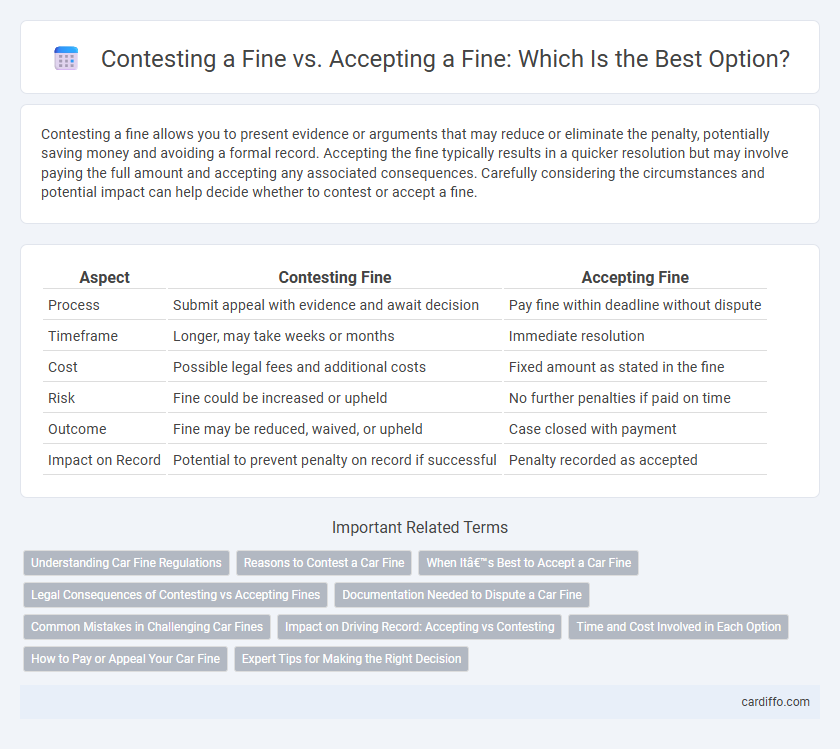Contesting a fine allows you to present evidence or arguments that may reduce or eliminate the penalty, potentially saving money and avoiding a formal record. Accepting the fine typically results in a quicker resolution but may involve paying the full amount and accepting any associated consequences. Carefully considering the circumstances and potential impact can help decide whether to contest or accept a fine.
Table of Comparison
| Aspect | Contesting Fine | Accepting Fine |
|---|---|---|
| Process | Submit appeal with evidence and await decision | Pay fine within deadline without dispute |
| Timeframe | Longer, may take weeks or months | Immediate resolution |
| Cost | Possible legal fees and additional costs | Fixed amount as stated in the fine |
| Risk | Fine could be increased or upheld | No further penalties if paid on time |
| Outcome | Fine may be reduced, waived, or upheld | Case closed with payment |
| Impact on Record | Potential to prevent penalty on record if successful | Penalty recorded as accepted |
Understanding Car Fine Regulations
Understanding car fine regulations is crucial when deciding between contesting or accepting a fine. Contesting a fine often requires detailed knowledge of traffic laws, evidence collection, and the appeals process to improve chances of success. Accepting the fine might result in immediate payment but could affect driving records and insurance premiums depending on local jurisdiction rules.
Reasons to Contest a Car Fine
Contest a car fine when evidence shows the alleged violation did not occur or was due to an error in the ticket details such as incorrect plate number or location. Legal defenses include proving that the traffic sign was obscured or missing, which violated proper notification requirements. Contesting fines can also be justified if there are valid circumstances like medical emergencies or mechanical failures that prevented compliance with traffic laws.
When It’s Best to Accept a Car Fine
Accepting a car fine is often the best choice when the evidence against you is clear, such as undeniable traffic camera footage or multiple witness accounts. Paying the fine promptly can save you from court fees, increased penalties, or potential license suspension. This option is advisable when contesting would likely lead to higher costs, time consumption, or stress without a reasonable chance of dismissal.
Legal Consequences of Contesting vs Accepting Fines
Contesting a fine can lead to extended legal proceedings, increased court costs, and the risk of higher penalties if the challenge fails, while accepting a fine typically resolves the matter quickly without further legal implications. Legal consequences for contesting may include a formal hearing where evidence must be presented, and failure to comply with court requirements can result in default judgments or license suspensions. Accepting a fine often implies an admission of guilt, which may impact insurance premiums but avoids the uncertainty and potential escalation associated with contesting the charge.
Documentation Needed to Dispute a Car Fine
To effectively dispute a car fine, gather all relevant documentation such as the original traffic ticket, photographic evidence of the alleged violation, and any witness statements that support your claim. Include official reports or calibration certificates for speed detection devices if applicable, ensuring that all documents are organized and clearly legible. Proper documentation strengthens your case by providing concrete evidence to challenge the fine's validity in court or administrative review.
Common Mistakes in Challenging Car Fines
Common mistakes in contesting car fines include missing the deadline for appeals, providing insufficient or irrelevant evidence, and failing to understand the specific traffic regulations involved. Many drivers also neglect to read the fine's instructions carefully, leading to incomplete or improperly formatted objections that result in automatic rejections. Collecting clear documentation such as photos, witness statements, and accurate timing details significantly increases the chances of successfully challenging a traffic fine.
Impact on Driving Record: Accepting vs Contesting
Accepting a fine typically results in the violation appearing on your driving record, which may increase insurance premiums and affect overall driving history. Contesting the fine provides an opportunity to challenge the citation and potentially avoid points on your record, preserving your driving status and avoiding insurance hikes. However, losing the contest may lead to additional penalties or court fees, making the decision critical for maintaining a clean driving record.
Time and Cost Involved in Each Option
Contesting a fine often requires significant time investment due to legal procedures, hearings, and potential delays, which can result in higher overall costs including legal fees. Accepting the fine usually allows for quicker resolution with a fixed cost, minimizing time spent but forfeiting the chance to reduce or eliminate charges. Evaluating both options involves balancing the immediate financial impact against potential savings and the time commitment of contesting.
How to Pay or Appeal Your Car Fine
Paying your car fine is straightforward through online portals, payment kiosks, or authorized centers, ensuring timely settlement to avoid extra penalties. To appeal your car fine, gather evidence like photos or witness statements and submit a formal contestation via the traffic authority's official website or in person at the local traffic office. Understanding deadlines for payment or appeal submission is crucial to prevent escalation or additional charges on your vehicle fine.
Expert Tips for Making the Right Decision
Expert tips for contesting a fine emphasize thorough evidence collection, including photographs, witness statements, and official documents that support your claim. Assess the validity of the fine by reviewing legal regulations and precedents specific to your case, ensuring you understand potential penalties and chances of success. Consulting with a legal expert or traffic attorney can provide personalized advice and improve the likelihood of a favorable outcome when deciding whether to contest or accept the fine.
Contesting fine vs accepting fine Infographic

 cardiffo.com
cardiffo.com